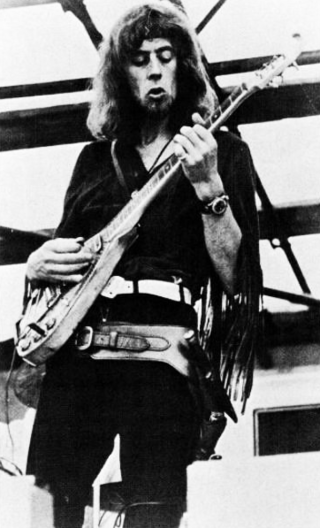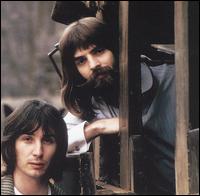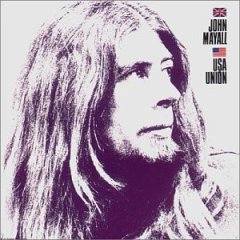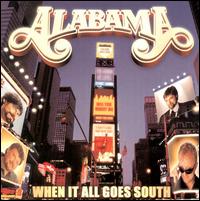
John Mayall & the Bluesbreakers were an English blues rock band led by multi-instrumentalist, singer and songwriter John Mayall. The band has been influential as an incubator for British rock and blues musicians. Many of the best known bands to come out of Britain in the 1960s and 1970s had members that came through the Bluesbreakers at one time, forming the foundation of British blues music that is still played heavily on classic rock radio. Among those with a tenure in the Bluesbreakers are guitarists Eric Clapton, Peter Green and Mick Taylor, bassists John McVie, Jack Bruce and Tony Reeves, drummers Hughie Flint, Aynsley Dunbar, Mick Fleetwood and Jon Hiseman, and numerous others.

John Brumwell Mayall was an English blues and rock musician, songwriter and producer. In the 1960s, he formed John Mayall & the Bluesbreakers, a band that has counted among its members some of the most famous blues and blues rock musicians. A singer, guitarist, harmonica player, and keyboardist, he had a career that spanned nearly seven decades, remaining an active musician until his death aged 90. Mayall has often been referred to as the "godfather of the British blues", and was inducted into the Rock and Roll Hall of Fame in the musical influence category in 2024.

Canned Heat is an American blues and rock band that was formed in Los Angeles in 1965. The group has been noted for its efforts to promote interest in blues music and its original artists. It was launched by two blues enthusiasts Alan Wilson and Bob Hite, who took the name from Tommy Johnson's 1928 "Canned Heat Blues", a song about an alcoholic who had desperately turned to drinking Sterno, generically called "canned heat". After appearances at the Monterey and Woodstock festivals at the end of the 1960s, the band acquired worldwide fame with a lineup of Hite (vocals), Wilson, Henry Vestine and later Harvey Mandel, Larry Taylor (bass), and Adolfo de la Parra (drums).

Mother Lode is the fourth studio album by singer-songwriter duo Loggins and Messina, released in late 1974. It was their final album with their original backing band, because multireedist and violinist Al Garth would soon leave the band, but multireedist Jon Clarke, bassist Larry Sims and drummer Merel Bregante remained, and saxophonist Don Roberts made his debut on this record. Future Toto keyboardist David Paich plays keyboards on this album while percussionist Milt Holland is augmented by Victor Feldman and the album was recorded on location at Jim Messina's California ranch. The Jim Messina composition "Keep Me in Mind" was sung by bassist Sims, whom Messina praised for having a phenomenal voice in a 2009 interview with Loggins for KCTS-TV.

Crusade is the fourth album and third studio album by the British blues rock band John Mayall & the Bluesbreakers, released on 1 September 1967 on Decca Records. It was the follow-up to A Hard Road, also released in 1967. As with their two previous albums, Crusade was produced by Mike Vernon. The album was the first recordings of the then-18-year-old guitarist Mick Taylor.

Future Blues is the fifth album by American blues and rock band Canned Heat, released in 1970. It was the last to feature the band's classic lineup, as Larry Taylor and Harvey Mandel had both departed by July 1970, prior to its release to record with John Mayall and songwriter Alan Wilson died shortly after on September 3, 1970. It was also the only classic-era Canned Heat studio album to feature Mandel, as Henry Vestine had been the lead guitarist on the previous albums. Their cover of "Let's Work Together" by Wilbert Harrison became a hit. "London Blues" features Dr. John. It was re-released on CD in 2002 by MAM productions with five bonus tracks.

Living the Blues is the third album by Canned Heat, a double album released in late 1968. It was one of the first double albums to place well on album charts. It features Canned Heat's signature song, "Going Up the Country", which would later be used in the Woodstock film. John Mayall appears on piano on "Walking by Myself" and "Bear Wires". Dr. John appears on "Boogie Music". The 20-minute trippy suite "Parthenogenesis" is dwarfed by the album-length "Refried Boogie", recorded live.
Mark–Almond was a jazz-influenced English pop group of the 1970s and early 1980s, sometimes also called The Mark-Almond Band. The core members were Jon Mark, who sang lead and played guitar, percussion, and harmonica, and Johnny Almond, who played saxophone, flute and bass flute and sang back-up. Various other musicians recorded and toured with the duo at various times, notably including drummer Dannie Richmond, a longtime associate of jazz bassist Charles Mingus.

Samuel Lawrence "Larry" Taylor was an American bass guitarist, best known for his work as a member of Canned Heat. Before joining Canned Heat he had been a session bassist for The Monkees and Jerry Lee Lewis. He was the younger brother of Mel Taylor, long-time drummer of The Ventures.

The Turning Point is a live album by John Mayall, featuring British blues music recorded at a concert at Bill Graham's Fillmore East on 12 July 1969.

USA Union is a 1970 album by blues musician John Mayall, featuring Harvey Mandel on guitar, Larry Taylor on bass and Don "Sugarcane" Harris on violin. The album was recorded on July 27 & 28th, 1970 at Larrabee Studios in LA and released by Polydor later in the same year John Mayall - Discography.

When It All Goes South is the nineteenth studio album by American country music band Alabama, released in 2001. It produced the singles "When It All Goes South", "Will You Marry Me" and "The Woman He Loves". This became Alabama's final studio album of original materials until 2015's Southern Drawl. It ranked at No. 37 in Billboard Album Charts and No. 4 on Country Album Chart.

Back to the Roots is a 1971 double album by John Mayall released on Polydor. Recording sessions took place both in California and London where Mayall invited some former members of his band, notably guitarists Eric Clapton and Mick Taylor. At the end of the 1980s Mayall remixed some tracks and issued them along with some of the older material as Archives to Eighties. An expanded two-CD version of Back to the Roots now includes both the original and later remixed versions of the tracks.

Bottom Line is an album by the English musician John Mayall, released in 1979. It was produced by Bob Johnston. It is the only Mayall album that has never been released on CD.

Johnny Almond was a British saxophonist, who is best known for his recordings with the Alan Price Set, Fleetwood Mac, John Mayall and Mark-Almond.

Looking Back is the seventh album released by John Mayall in August 1969 by Decca Records. The album features songs by both John Mayall's Bluesbreakers and John Mayall solo work. The album reached No. 79 on the Billboard 200. Confusingly, there are two different albums with the title "Looking Back": a Decca UK release as a single album and a Decca Germany release as a double album. Later issues on CD would use the Deram label.

John Michael Burchell, known professionally as Jon Mark, was an English singer-songwriter and guitarist, best known for his recordings with Marianne Faithfull, Sweet Thursday, John Mayall and Mark-Almond. Mark, who received a Grammy in 2004, lived in Rotorua, New Zealand.

The discography of English blues rock musician John Mayall, including the band John Mayall & the Bluesbreakers, consists of 35 studio albums, 34 live albums, 24 compilation albums, four extended plays (EPs), 44 singles and four video albums. Mayall's 38th studio album was released in 2022.
















